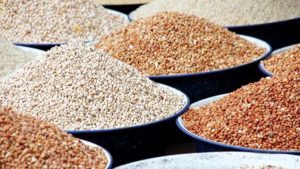In today’s fast-paced world, the appeal of processed foods, from quick breakfast cereals to convenient microwave meals, significantly impacts our dietary choices and health outcomes.
Despite their convenience, processed foods often come at a cost to our health, being laden with high levels of sugars, salts, and unhealthy fats.
The urgency to shift towards healthier eating habits is more pronounced than ever, especially in light of a 2022 research by A.D. Oguizu and E.U. Celestine from Rivers State University of Science and Technology, Department of Public Health Sciences, which highlighted the significant association between the consumption of ultra-processed foods and obesity among adolescents in Nigeria.
This study underscores the global nature of the processed food challenge, reinforcing the need for practical strategies to reduce processed food consumption.
 Concerns about processed foods
Concerns about processed foods
Processed foods, abundant in our diets, from tinned vegetables and savory snacks like crisps, bread, and meat products such as sausages, pose significant health risks.
These foods contribute to obesity, type 2 diabetes, heart disease, and other chronic conditions due to their high content of sugars, salts, and unhealthy fats. A.D. Oguizu and E.U. Celestine’s research found a staggering prevalence of obesity among adolescents consuming ultra-processed foods, with 77.6% of female respondents categorized as obese.
This finding emphasizes the critical need for mindful eating and informed dietary choices.
Changing your dietary choices


Taking more whole foods: Dr. Frank Hu, Professor of Nutrition and Epidemiology, emphasizes the importance of whole, unprocessed foods such as fruits, vegetables, lean proteins, and whole grains. These foods are rich in essential vitamins, minerals, and fiber, offering health benefits without the added preservatives and unhealthy components found in processed foods.
By stocking pantry and fridge with legumes, whole grains, and a wide range of fruits and vegetables, making healthier choices becomes more convenient
Emphasizing whole foods can counteract the trends observed in studies like that by Oguizu and Celestine, which showed high consumption of processed items like cakes, soft drinks, and instant noodles among adolescents.
The power of home cooking: Advocated by Dr. Marion Nestle, American molecular biologist and nutritionist, cooking at home allows for control over ingredients, enabling the avoidance of unnecessary additives.
This practice not only ensures a healthier diet but fosters a deeper connection to the food we consume, contrasting sharply with the convenience-driven choices that contribute to the high obesity rates identified in the Nigerian study.
 Learn to read food labels: Dr. Dariush Mozaffarian a cardiologist and public health scientist highlights the importance of scrutinizing labels for ingredient lists and nutritional content, advocating for items with fewer and more recognizable ingredients.
Learn to read food labels: Dr. Dariush Mozaffarian a cardiologist and public health scientist highlights the importance of scrutinizing labels for ingredient lists and nutritional content, advocating for items with fewer and more recognizable ingredients.
This knowledge is vital in avoiding foods high in additives and preservatives, which are prevalent in the diets of individuals consuming high levels of ultra-processed foods.


Gradual dietary shift: Emphasizing gradual change, Dr. Michael Greger an American physician and writer also suggests that transitioning to a diet low in processed foods allows taste preferences and habits to evolve naturally.
This approach is crucial for sustainable change, away from the high consumption of processed items like those reported in the Nigerian study, towards a healthier dietary pattern.
Strategic meal planning: Highlighted by Elizabeth Ofili a Nigerian American physician, meal planning and preparation can significantly reduce the reliance on convenience foods, encouraging healthier eating patterns.
This strategy directly addresses the convenience factor that drives the consumption of processed foods, as seen in the frequent intake of packaged breads, cookies, and instant noodles among adolescents.
 Stocking up on healthy staples: Dr. Elizabeth Ofili also notes the importance of keeping a variety of whole foods readily available.
Stocking up on healthy staples: Dr. Elizabeth Ofili also notes the importance of keeping a variety of whole foods readily available.
By stocking pantry and fridge with legumes, whole grains, and a wide range of fruits and vegetables, making healthier choices becomes more accessible and convenient. This is a direct countermeasure to the ease of reaching for processed foods, which contribute to the alarming rates of obesity and overweight observed in studies like that conducted by Oguizu and Celestine.
Benefits of reducing processed food intake
Adopting a diet that prioritizes whole, unprocessed foods over their processed counterparts can lead to numerous health benefits, including better weight management, improved metabolic health, increased energy levels, and a reduced risk of chronic diseases.
The association between eating ultra-processed foods and obesity underscores the urgent need for dietary shift
The significant association between the consumption of ultra-processed foods and obesity, as found in the study by Oguizu and Celestine, underscores the urgent need for a dietary shift. This transformation is not merely about eliminating certain foods but about fostering a healthier, more vibrant lifestyle.
Conclusion
The global trend towards increased processed food consumption, with its associated health risks, necessitates a reevaluation of our dietary choices. By embracing the strategies outlined by leading nutrition experts and informed by the research of Oguizu and Celestine, individuals can effectively navigate the modern food environment.
This journey towards healthier eating is an investment in our well-being, promising a future where food nourishes and sustains rather than contributes to disease. It’s a commitment to a life enriched by the power of informed choice and the profound benefits of whole, nourishing foods.


